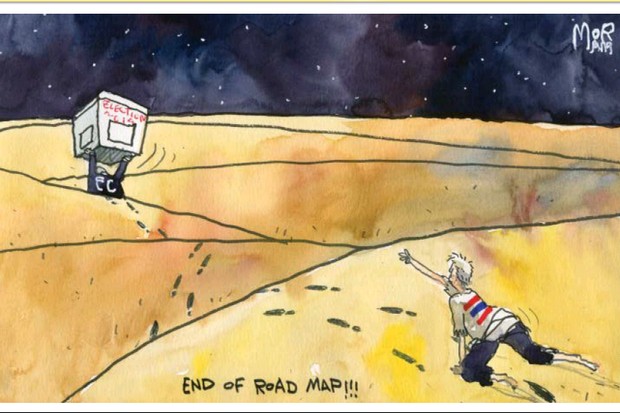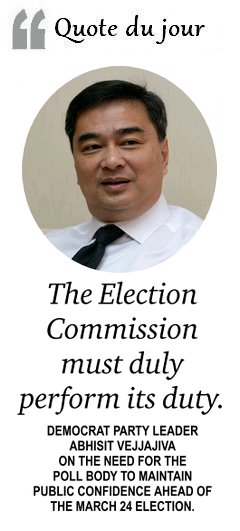
As the royal decree for the general election has been issued, the countdown for the country's return to democracy has officially begun.
The decree was bestowed by His Majesty the King, and countersigned by Prime Minister Prayut Chan-o-cha, before it was published in the Royal Gazette yesterday. The Election Commission (EC) immediately sprung into action. As soon as the decree was gazetted, it immediately announced the poll date of March 24 and rolled out a timetable for the election.

The official poll date accorded with the date that Deputy Prime Minister Wissanu Krea-ngam had earlier anticipated. Mr Wissanu, who also serves as one of the military regime's legal experts, believed that March 24 is an appropriate date to hold the election as it allows for enough time for political campaigning.
Some political activists may frown upon the fact that the election is delayed from the initial tentative date of Feb 24. However, a delay of a few more weeks should be acceptable, given the circumstances.
From this week on, politics will heat up as politicians -- both novices and veterans -- ramp up their campaigns in order to win as many seats as possible to increase their chances of forming a united government.
It must also be noted that from this day onward, there is no turning back. All stakeholders -- including politicians, state representatives, the EC, as well as civic groups -- have a duty to ensure the freedom, fairness, and therefore the success of the election.
The EC, in particular, must prove itself as an independent body that is free from the regime's sway, as some commentators have claimed, in order to maintain the public's confidence in the entire process.
At the same time, the military regime must assume the role of a caretaker administration and avoid making decisions that will give it an unfair political advantage over its rivals -- which includes the assignment of election-related duties to its core figures.

The four cabinet ministers who are also key members of the Palang Pracharath Party -- including Industry Minister Uttama Savanayana -- must also tender their resignations immediately and perform their roles as politicians on a level playing field with their rivals.
While Gen Prayut's political future remains vague, it is quite certain that he will remain in politics as he had promised upon taking power in 2014.
For example, Thailand's political infrastructure -- including the formation of new political parties -- has been aimed at accommodating his return. Even more telling is his recent comment on how he would consider cooperating with political parties that are willing to pursue his regime's policies.
Gen Prayut must realise that his post-coup role will not be an easy one. The prime minister should look and learn at the mistakes of his predecessors -- Gen Suchinda Kraprayoon, for instance, who had to resign in disgrace after the 1992 popular uprising -- and do his best to prevent the repeat of that chapter of Thai history in the future.
The time is ripe for Thailand to look and learn from its immediate neighbour to the south. Last year, Malaysia showed to the world how ballot-casting is the best way to bring about political change, with 93-year old Mahathir Mohammad leading his coalition to topple his arch-rival Najib Razak from the state's top job.
For countries that have suffered longstanding conflicts, returning to normalcy is a difficult, but not impossible task.
As long as all stakeholders agree to give democracy a chance and are willing to do their best to ensure the election is fair, the goal is within reach.
